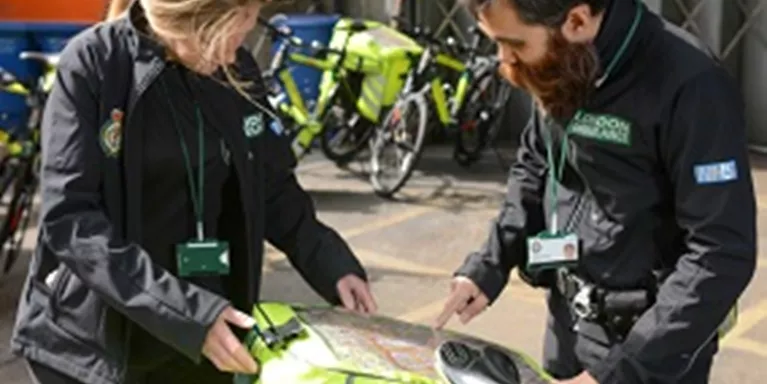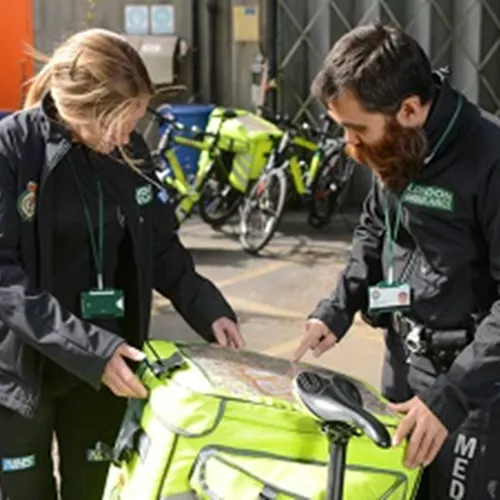Coping with what you experience in the ambulance service
This information is for anyone working in the ambulance service, whether you manage a team, help people by responding to calls, work from home or in an office, or are a paramedic.
20 minute read
View this information as a PDF (new window)
On this page:
- Recognising how you’re feeling now
- Understanding why you might be feeling this way
- Tools and strategies to cope
- Thinking about the future
- Where to get support
As a member of the ambulance service, you deal with a lot. And the things you experience on a daily basis can have an enormous impact on your mental health.
The pandemic may have made your job even harder. And even though a lot of society has gone back to the way it was before, you might still be dealing with feelings and experiences you had during coronavirus (covid-19).
This information might help you to make sense of the things you see and experience in the ambulance service. It’s not a replacement for mental health treatment and support. But it may give you some tools to help you understand how you’re feeling, and some tips on how to cope with these feelings.
Recognising how you're feeling now
We experience many different feelings every day. Feelings can help guide us in how to respond to the situations we find ourselves in. But often, we can’t give a name to every feeling we’re having, when we have it.
Because of the job you do, you might have been dealing with lots of things you’ve found difficult, and not had the time to think about them properly. This might be especially true of things which happened during coronavirus. You might be having feelings now, as a result of something that happened a while ago.
Identifying some of the feelings you’re having now might help you to understand what could have caused them. And once you know the causes, you might feel better prepared for how to deal with these feelings.
How do I start to recognise how I'm feeling?
Recognising how you’re feeling might help you to understand why you reacted the way you did to certain situations in the past. For example, you might have had a sleepless night, and not associated it with the stressful calls you’d taken that day. Maybe you had an argument with someone you care about, without really knowing why.
Putting your feelings into words could help you to understand the emotions you’re having. There are different ways you can do this, and everyone’s preferences will be different. Here are some suggestions:
- Write it down. Some people find that writing about the things they’re feeling, or keeping a diary, can be helpful. If you don’t want to write about it, you could try other creative ways to express how you’re feeling, like drawing or painting.
- Say it out loud. Some people find that talking about what they’re going through, or what’s happened in their day, can help them to recognise how they feel about what’s happened. You don’t have to do this with another person. You could try it at home on your own.
- Practise mindfulness. Mindfulness is a technique which involves making a special effort to notice what's happening in the present moment (in your mind, body and surroundings), without judging anything. Mindfulness can help you to notice the negative and positive feelings you’re having.
“You try and compartmentalise everything you do – you go to nasty jobs and you try and leave it behind. But you've got your own stresses on top of that, your own mental health – it makes the job extremely hard.” – David, paramedic
Below are some of the things members of the ambulance service have told us they’ve been through in their roles. You might be experiencing some of these, and may also be having feelings which aren’t listed here.
Stress
When we say things like "this is stressful" or "I'm stressed", we might mean:
- Situations or events that put pressure on us. These are times where we have lots to do and think about, or don't have much control over what happens. For example, going to lots of patients who are very unwell and need urgent care.
- Our reaction to being placed under pressure. These are the feelings we get when we have demands placed on us that we find difficult to cope with. For example, feeling worried about how you’ll manage to reach patients on time when you’re so busy.
If you’re experiencing stress, you might feel:
- Irritable, aggressive, impatient or wound up
- Over-burdened
- Anxious, nervous or afraid
- Like your thoughts are racing and you can't switch off
- Unable to enjoy yourself
- Depressed
- Uninterested in life
- Like you've lost your sense of humour
- A sense of dread
- Worried about your health
- Neglected or lonely
Anxiety
Anxiety is what we feel when we are worried, tense or afraid, particularly about things that are about to happen, or which we think could happen in the future.
Anxiety can affect:
- Our bodies – feeling sick, restless, or like your heart is racing
- Our minds – feeling tense or nervous, or like the worst is about to happen
- Our daily lives – it might feel harder to enjoy your free time, and it can affect things like your relationships and work
Moral injury
Moral injury describes a set of feelings you might have if you’ve had to do things, or see things, which go against your values and beliefs.
During the pandemic, you might have been forced to make some difficult decisions around supporting patients. For example, you might have had to care for one patient, while knowing there were other patients who also needed your help. This might have made you feel conflicted, or like you could have done more.
If you’re experiencing moral injury, you might feel:
- Guilty
- Ashamed
- Angry
- Disgusted
- Conflicted
“I’d often find myself just sat there, not really doing anything but thinking about the job, and thinking about whether there was anything else I could have done.” – Dan, ambulance service
Compassion fatigue
When you’re repeatedly looking after people in distressing or difficult circumstances, this can leave you feeling physically and mentally exhausted. You can end up feeling like you don’t care about people as much as you used to. This is sometimes known as compassion fatigue.
Compassion fatigue might make you feel:
- Angry or irritable
- Like you’re enjoying your job less
- Less confident about making decisions at work
- Less motivated to do your job
Trauma
Going through very stressful, frightening or distressing events is sometimes called trauma. Everyone has a different reaction to trauma. You might notice the effects quickly. Or you might not notice them until a long time afterwards.
A traumatic event might make you feel:
- Frightened
- Under threat
- Humiliated
- Rejected
- Abandoned
- Invalidated
- Unsafe
- Unsupported
- Trapped
- Ashamed
- Powerless
Post-traumatic stress disorder (PTSD) is a mental health problem you may develop after experiencing traumatic events. Emergency services staff and volunteers are routinely exposed to distressing and traumatic incidents, as well as having demanding workload pressures. As a result, they’re more at risk of developing PTSD than the general population.
We have more information on PTSD, including the causes, some of the symptoms you might experience, and the support you could get.
“It is very difficult to predict what will come on the line when you hear the beep, and during a block of three days I was unfortunate to have a slew of traumatic calls.” – Daniel, emergency medical dispatcher
Fatigue and burnout
Fatigue and burnout are more than feelings of being tired. Burnout can happen if you’re constantly under lots of pressure from work. It can make you feel:
- Exhausted, like you’re drained of energy
- Like you enjoy your job less, or don’t feel motivated to do it anymore
- Like you’re not doing your job as well as you used to

Burnout as a paramedic
“You bury your feelings deep, and sometimes you have to do that to deal with the job. You just carry on regardless, and it reaches a critical point where your brain and your body say "no more". Something has to give, and it's always the person, it's never the job.”
Guilt
Lots of people in the ambulance service were under extra pressure during the pandemic, and many still are now. If you’re struggling and feel like you need a break, it’s important to speak up.
But you might be feeling guilty about asking for extra support, especially when you know so many of your colleagues are struggling too. You might also feel worried about letting down the public. Try to remember that your wellbeing is just as important as the people you support. We have more information about where to get support.
Anger
You might find yourself feeling angrier during coronavirus. For example, you might have felt angry with people who broke lockdown rules, when you were working so hard. You might have felt angry with loved ones or the general public, if they denied that coronavirus exists.
This may have felt even harder when you had to treat patients who didn't follow the rules. It might have left you feeling demotivated, or like you were enjoying your work less.
Dissociation
Some people find it hard identify how they’re feeling, especially if they’ve been through something traumatic. This is sometimes known as dissociation.
If you dissociate, you may feel disconnected from yourself and the world around you. For example, you may feel detached from your body or feel as though the world around you is unreal. Dissociation is one way the mind copes with too much stress, such as during a traumatic event.
We have more information on dissociation, including tips on how to take care of yourself when you dissociate.
Understanding why you might be feeling this way
Once you understand what it is you’re feeling, you can start to think about what could have caused some of these feelings. This might make you feel better prepared for how to deal with them.
Some of the things in this list might be contributing to how you’re feeling now. You might also have had experiences which aren’t included here.
Dealing with more traumatic incidents
- Being in the ambulance service might mean you’re involved with traumatic incidents in your role. Trauma affects people differently, but there are some common mental health effects of trauma which you might experience.
- Hearing stories from colleagues can also feel traumatic, even if you weren’t there yourself.
- Dealing with people who may be physically or verbally abusive can be traumatic.
- During the pandemic, you may have cared for higher numbers of sicker patients. This may have left you feeling like there were no breaks or time to recover. You might still be feeling exhausted now.
- If you’re a call handler or emergency medical dispatcher, you may have taken a higher number of distressing calls during the pandemic.
- You might have had to make difficult changes to the way you work because of coronavirus. For example, not being able to take loved ones with you in the ambulance while taking a patient to the hospital.
- You may also have attended a higher number of suicides. Read our information on what to do if you’ve been bereaved by suicide.
Working patterns
- Shift work, long working hours and working alone can all have an impact on your mental health. They may affect your sleeping patterns or make it harder to create a regular routine.
- Because of the pandemic, the environment at work might have changed. For example, you might not have been allowed to gather in groups in break rooms, or there may have been new hygiene measures in place. This might have affected the closeness or friendships you felt with your colleagues. There might still be extra rules in place now.
- During the pandemic, the type of calls you answered, or jobs you attended, might have changed. You may have supported more patients experiencing a mental health crisis, or patients who were calling 999 instead of their GP. Your workload may have gone up.
- You might be experiencing particularly long handover times at hospitals. Demand for ambulance services is really high, which might mean you’re travelling further to cover larger areas, and often not finishing on time. This can be exhausting and can make you feel more stressed.
“At work, we are making life changing decisions in more difficult situations than ever before. These decisions are ones we are taking home with us.” – Ben, emergency dispatcher
Bereavement
Losing someone important to us can be emotionally devastating, and bereavement can have a huge impact on our mental health.
During the pandemic, you may have lost loved ones to coronavirus or other illnesses. You may not have been able to be there for them in the way you would have wanted. You may also have missed out on funerals, or not been able to hold a funeral in the way you imagined.
We have more information on bereavement, including places where you can get support.
Relationship changes
- Being stressed at work or dealing with difficult jobs can have an impact on relationships at home. You might find yourself needing support or wanting to be left alone. Seeing you under so much pressure might affect the people you live with, or the people close to you. We have more information on supporting someone who’s in the ambulance service – you might find it helpful to share this with friends or family members.
- You might find it hard to talk about what happens at work with your friends, family, or people you live with. You might want to protect them, or might feel like they won’t understand. This can be hard, especially if you feel like you’re bottling up what you’re thinking about or feeling.
- During the pandemic, you might have wanted extra support or different kinds of support from loved ones. Even though things are going back to how they were before, you might still be feeling the lasting impacts of these relationship changes.
- Not everyone has had the same experiences and reactions to coronavirus, and you may have lost friends, or found relationships have changed, because of your different experiences. It might feel strange if these relationships haven’t gone back to the way they were before.
Missing out on things because of coronavirus
You might have felt like during the pandemic, you were missing out on the rewarding or enjoyable parts of your job. Or, like you weren’t getting the ambulance service experience you were expecting. You might still feel like this, and you might feel like you’ve lost the love you once had for the job.
Hopes and fears
For many of us, the pandemic meant that things we hoped would happen, or looked forward to, suddenly felt less likely. And things we feared would happen might have felt closer to coming true. For example:
- You may have been worried about staffing levels before the pandemic. You might be even more worried about losing staff now.
- You may have been looking forward to things, like weddings or holidays abroad. These may have been cancelled or postponed. The pandemic has made things feel more uncertain for many people, and you might still feel worried about rearranging these plans now.
- If you experience health anxiety, the pandemic might have felt especially hard to deal with. You can find out more about health anxiety on the Anxiety UK website.
Getting back motivation
You don’t have to feel motivated all of the time, and many of us have days where we feel less motivated at work and at home. But if you’re feeling like you’ve lost some of the love and enjoyment you once had for your job, you might find these tips helpful.
- Set yourself achievable goals. Try to focus on a completing a small, achievable goal each day. You might find it helpful to break down each goal into smaller goals. If work already feels quite target-focused, try thinking of something which isn’t related to work.
- Reward yourself. Once you’ve completed the goal, reward yourself. It doesn’t have to be something big. You could try taking 15 minutes out of your day to do something you enjoy. For example, finding time to read a few pages of a book, or taking the dog for a walk.
- Try to do some physical activity. Some people find staying active helps them to focus and stay motivated. Exercise can help you feel more energised and responsive, especially if you do a physical role. It can feel hard to get out and do exercise when you’re feeling unmotivated, but you could try starting small, and gradually increasing the amount you do. We have more tips on how to start getting active.
- Try something new. Introducing new interests and activities in your life can help stimulate the brain, and may help you to feel more focused. You could try making some new recipes for dinner, changing your exercise routine, or finding a new hobby.
Coping with change
- Take stock of how you are feeling. If you feel able to, set aside some time to think about how you’re feeling about work, your home life, and your wellbeing in general. Think about how you’re feeling now compared to the middle of the pandemic, and see whether there are differences.
- Focus on the things you can control. It’s easy to become overwhelmed by uncertainty, and not knowing what’s going to happen in the future. Your role in the ambulance service might also mean you don’t know what kind of jobs you’ll go to, or the calls you’ll take each day. Try to focus on the things that are in your control.
- Have a daily routine. Routine and structure can help to reduce feelings of uncertainty. Think about all the day-to-day things that are within your control. Is there anything you could do every day, or every week, to make life feel more consistent? If you work in irregular shift patterns, are there things you could do during your shift days, and during your non-working days, to help separate the two? Try not to feel like your routine must be rigid. Incorporating new things can help you feel motivated and give you things to look forward to.
“The most important thing is to look after yourself as well as others, and to have someone you can talk to about how you are feeling if you need it.” – Amanda, peer supporter in the ambulance service
Dealing with stress
- Tell your manager if you’re feeling overburdened. It might be hard talking to your manager about your workload. You might feel like you shouldn’t complain if everyone else is also struggling, or like you’re just expected to cope. But ignoring the signs of burnout and stress can leave you feeling emotionally and mentally exhausted. Speak to your manager to see whether your workload could be adjusted.
- If your manager is contributing to your feelings of stress, think about who else you could speak to at work. You could try another manager you trust, a colleague, or a staff network.
- Speak to someone you don’t work with. You might prefer to talk about how you’re feeling with someone who’s not at work, like a friend or family member. It might feel hard speaking to loved ones about the things you deal with at work, and you might feel like you want to protect them from certain things. But remember, you can be in charge of how much you tell them. Read our tips on starting a conversation about mental health with friends and family.
- Take time for yourself. Try to build some time into your day, just for you. Even if this is a five minute walk, or 15 minutes to read a book. Try to make this a priority, but don’t be too harsh on yourself if you can’t always find the time.
- Try practising mindfulness. Mindfulness can help you to focus on the present. It can also help to clear your head, and make you feel calmer, which might help when dealing with stressful situations.
- Spend some time in nature. Spending time in nature can be good for your mental wellbeing, and has been found to help with specific mental health problems like anxiety and depression. It can also help to reduce feelings of stress. You could find some ways to incorporate nature into your working day. For example driving a more scenic route to work, or having a plant or something which reminds you of nature on your desk. Read our ideas for how to spend time enjoying nature.
We have more information on staying mentally healthy at work, including tips on how to cope with stress.
“Sometimes, when my head has too much going on, music doesn’t work for me. I have to lay on my bed and ask Alexa to play some mediation music. Just focusing on your breathing with your eyes closed can really help.” – Ben, emergency dispatcher
Feeling more positive
It’s very uncommon to feel positive all of the time, and most of us will have periods where we feel better or worse. But working during the pandemic may have left you feeling worse about yourself, your job, or society in general.
Try to be kind to yourself. Notice when you’re thinking negative things about yourself. If you had a difficult shift, are you telling yourself that you should have done better, or that it was your fault when things went wrong? Try to challenge these negative thoughts. Think about the things you did well instead.
You could also take a break from news and social media. During the pandemic especially, it may have felt like all you heard was bad news. Even though coronavirus isn’t in the news as much anymore, watching a lot of news or being on social media a lot can still feel overwhelming. You don’t have to cut them out completely, but you could limit how much time you spend reading them each day.
You could also try to think of some positive things which are happening in your life, or things you feel grateful for. This could be a good news story you heard, a positive conversation you had with a colleague, or a time you laughed recently. You could write down your positive things and reread them when you’re feeling low.

Peer support in the ambulance service
“If I'm feeling overwhelmed then I take a step back. It helps me refocus and recharge my batteries. I try not to be too hard on myself if I have a bad day, or if I feel I haven't coped as well as I should have.”
Thinking about the future
We don’t know what might happen in the future. At work, some things might be returning to how they were before the pandemic. And there may be some things, like hygiene measures and caseloads, which are still different.
Having some strategies for how you’ll cope with things now we’re moving out of the pandemic might help with any feelings of uncertainty or worry you might have:
- Give yourself time to adjust. Everyone has their own response to the changes coronavirus has caused. It’s important to take things at your own pace. Try not to put pressure on yourself to fill up your diary, or to do lots of things now restrictions have lifted.
- Control the things you can. Try to focus on the things you can change, rather than the things that are outside your control.
- Share you worries with someone at work. If you’re worried about how work has changed now we’re moving out of the pandemic, try speaking to your manager or someone else you trust at work. Together, you might be able to think of some ways to make working a bit easier.
- Remind yourself that it’s OK to feel anxious about the future. We don’t know what the future holds, so it’s OK if you feel uncertain about it. It’s a natural response. You might find it helpful to read our tips for taking care of yourself when you’re anxious.
“Talking to my peers has also been a massive help. It helps me realise that what I’m going through is normal, and that many people experience things like this from time to time.” – Dan, ambulance service
Anniversaries
You may have experienced lots of big changes to your life during the pandemic. You may have lost loved ones, or missed out on important events. And when the anniversaries of these moments come around, you might find it brings up some difficult feelings.
It can be helpful to take a moment to think about the events that have had a big impact on your life. If you want to, you could plan something on the date of the event’s anniversary. You could meet up with other people who were affected. Or, you might prefer to spend some time reflecting on your own. You might find these pages helpful:
- Cruse Bereavement Care has information on bereavement and coronavirus.
- Our page of useful contacts for coronavirus has a list of organisations offering bereavement support.
- Read more information on our pages about bereavement and trauma.
Where to get support
Seeking help for a mental health problem can be a really important step towards getting and staying well, but it can be hard to know how to start or where to turn to. There are many resources, services and organisations which offer mental health support for people in the ambulance service.
Stigma in the ambulance service
We know it can be difficult to reach out for help at work, especially when so much of your job is spent helping others. It can feel like there’s a stigma in the ambulance service, where you feel you have to put on a brave face and not admit that you’re struggling. Some people have told us they feel like they’ve ‘failed’ when they admit how much their work has affected their mental health.
It’s always OK to ask for help. Reaching out could help you to get the support you need to feel better. And if you don’t feel comfortable speaking to someone at work, there are other organisations which might be able to help.
If you’re a line manager, think about how you could encourage your team members to come to you if they need to talk. You might find it helpful to read our resources on taking care of your staff. This includes information on how to support your team members, and how to create a mentally healthy workplace.
When is it OK to get support?
There isn’t a specific time for when you’re supposed to get mental health support. It's always OK to seek help, even if you're not sure you’re experiencing a specific mental health problem.
You might choose to seek help because:
- You're finding it difficult to cope with your thoughts and feelings
- Your thoughts and feelings are having an impact on your day-to-day life
- You want to know what’s available
Read our information on how to seek help for a mental health problem.

Challenging stigma in the ambulance service
“In the ambulance service, we like to have this feeling that we’re bulletproof, and sometimes you can feel a bit ashamed to admit that there’s something wrong with you. But we’re humans, not robots.”
Support from your workplace
Ask your supervisor, line manager or colleagues if you can access specialist support. Some of the following things may be helpful:
- Trauma Risk Management (TRiM). In some areas, TRiM is facing backlogs because of the pandemic and it may be harder to access than usual. You may be able to access some of the other things in this list instead.
- Critical Incident Stress Debriefing (CISD)
- An Employee Assistance Programme (EAP) helpline
- Counselling services
- Going to Schwartz rounds
- Peer support groups, including support groups on social media
- Support from occupational health
- Many NHS trusts have chaplains who you can speak to, whether you’re religious or not
- NHS staff mental health and wellbeing hubs
If you're a student paramedic you might be able to access extra support through your course provider. Our student mental health hub has more tips and resources for anyone who is studying.
Support from organisations
- The Ambulance Staff Charity offers support for the ambulance community, including bereavement support, physical rehabilitation, financial support and specialist help for trauma or PTSD.
- Head First is a free, online mental wellness resource for people in the ambulance service, created by the NHS.
- First Hand is a free online resource for anyone who’s been affected by witnessing a suicide, when they didn’t know the person who died. It was created by the charity, Grassroots Suicide Prevention.
- Our resource on how to be mentally healthy at work includes information on staying mentally healthy at work, with suggestions for what you can do if you’re experiencing poor mental health.
- We have information on different helplines and listening services if you’re in a crisis and need to talk to someone.
Professional mental health support
When you're struggling to cope and self-care isn't enough, support from a professional can make a difference. This could include:
“Talking to my colleague probably saved my life. Having the chance to open up to someone was the beginning of a process that ended with me being correctly diagnosed and treated for the mental health problem I was living with.” – Neil, ambulance service
This information was published in May 2022. We will revise it in 2025.
References are available on request. If you would like to reproduce any of this information, see our page on permissions and licensing.















